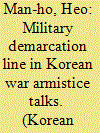| Srl | Item |
| 1 |
ID:
128016


|
|
|
|
|
| Publication |
2014.
|
| Summary/Abstract |
For the Korean War Armistice Talks, as in any war, the establishment of the military
demarcation line was one of the major points of contention between the UN and
Communist forces. Furthermore, the lack of a maritime demarcation line was a
distinct marker in the case of the Korean War. As most international negotiations
do not include detailed information beyond the official transcripts, external indicators
and indirect measures must be considered for a more complete analysis. While
this inferred approach cannot replace a direct systematic study of the negotiation
process, it can still produce some enlightening explanations.
In particular, based on negotiation theory, the current research will focus on the
causes and processes that led to the rejection of the UN forces' request to shift the
land demarcation line further north in return for lifting their naval blockade of the
North Korean sea areas, and the settlement of the maritime demarcation line as it
is today. Thus, the processes, agenda setting, and conclusions of the negotiations
are examined, along with the policy of the United States for ending the Korean
War.
|
|
|
|
|
|
|
|
|
|
|
|
|
|
|
|
| 2 |
ID:
083353


|
|
|
|
|
| Publication |
2008.
|
| Summary/Abstract |
The continuing infringements of human rights in North Korea due to the totalitarian rule and inefficiency of the regime represent "a consistent pattern of gross and reliably attested violations of human rights." Thus, we can predict North Korea's future human rights conditions by examining the durability and diversity of the human rights policies adopted by Asia's communist states in their post-Stalinist or post-totalitarian stage when undertaking open and reform policies. Supposing that social control becomes ineffective, a continuing dynamic equilibrium will be secured through the reorganization of social institutions, where the existing ones have ceased to function. Such a situation will obviously pose a serious threat to the existing political regime. Thus, to protect their regime, the North Korean leaders will further violate the human rights of their people. Therefore, one of the most effective policy responses would be to induce the North Korean authorities to connect with international human rights protection systems without causing any immediate threat to the long-term stability of the North Korean regime. Accordingly, the current study examines possible forms of multilateral talks on North Korean human rights issues and relevant strategies that may induce North Korea's participation.
|
|
|
|
|
|
|
|
|
|
|
|
|
|
|
|